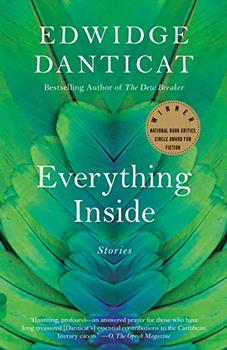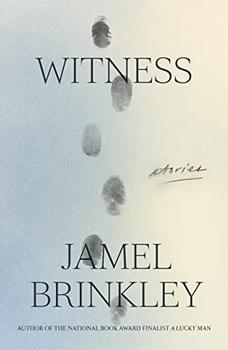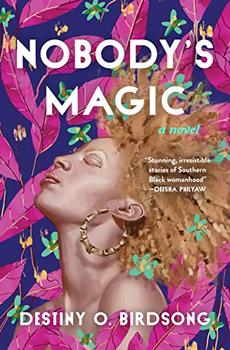Summary | Excerpt | Reviews | Beyond the book | Read-Alikes | Genres & Themes | Author Bio

Critics' Opinion:
Readers' Opinion:
First Published:
Aug 2019, 240 pages
Paperback:
Jul 2020, 240 pages
 Book Reviewed by:
Book Reviewed by:
Lisa Butts
Buy This Book
Edwidge Danticat is a Haitian-American writer, and Haiti looms large as a presence in this collection, just as it does in her other books, including National Book Award nominee Krik, Krak! (1996), her only other collection of short stories. All of Everything Inside's characters have some connection to Haiti, be it overt or subtle, but to focus too narrowly on this feature is to miss the grander point. Danticat's creations are human first and foremost, and usually painfully so. These are stories about the breakdown of human connections, of communication, of the body and mind. The Haitian settings (including Miami's Little Haiti) are largely atmospheric—important, but hardly the most interesting aspect of the collection.
Loss plays a central role throughout these stories. There is a palpable sense of what might have been. Characters suffer heartache that often seems senseless, or as though it could have been averted. In "Dosas," the collection's opener and one of its best, a woman loses her husband to her best friend, and on top of that, they dupe her out of her life savings. She is left wondering how she could have been so gullible, and which part of the betrayal is worse. Curiously, she also wonders what might have happened if her husband had met and married her best friend instead of her in the first place, or even if she herself had taken a liking for the bartender at her favorite local bar instead of the man she married. How might this crisis have been stopped in its tracks, or derailed onto another path?
Similarly, in "The Gift," two former lovers meet for dinner after having been apart for seven months. The man had been living in Haiti, where he suffered a terrible personal tragedy, after which he swore off his extramarital affair with the woman forever. The two clearly love each other deeply, but the man is irreparably broken, and determined to stick to his vow, even if it means never experiencing happiness again. Is this the right decision? The reader is left to ponder not so much the morality of the man's choice, but the enormity of his loss—to sit with it, as his lover must, and to empathize, knowing nothing can be done to assuage his guilt and pain; nothing will convince him he deserves to be happy.
"Sunrise, Sunset" is a moving, mournful narrative about a woman's descent into dementia, told from the alternating perspectives of the woman herself; her husband, watching the woman he loves slip away; and her daughter, who is suffering from postpartum depression. Danticat expresses the woman's suffering with sensitivity and a shrewd understanding of what it means to love and lose under these heart-rending circumstances: "Then it returns again, that all-too-familiar sensation of herself waning. What if she never recognizes anyone again? What if she forgets her husband? What if she stops remembering what it's like to love him, a feeling that has changed so much over the years..." At the end of this story, Danticat brings together the disparate threads of each character's own personal inner conflict in a masterful turn of plotting that allows for the daughter's personal growth. That's the thing—though these stories are fundamentally sad, the author cultivates subtle silver linings that prevent them from ever becoming maudlin or melodramatic.
The stories in Everything Inside are deeply contemplative, and the author's pace is very slow. If you seek fast-moving plots, look elsewhere. But if you like character-driven fiction with emotional depth and complexity, narrated by an author with a poet's linguistic sensibility, don't pass this one up.
![]() This review was originally published in The BookBrowse Review in September 2019, and has been updated for the
August 2020 edition.
Click here to go to this issue.
This review was originally published in The BookBrowse Review in September 2019, and has been updated for the
August 2020 edition.
Click here to go to this issue.

If you liked Everything Inside, try these:

by Jamel Brinkley
Published 2024
From National Book Award finalist Jamel Brinkley, Witness is an elegant, insistent narrative of actions taken and not taken.

by Destiny O. Birdsong
Published 2023
In this glittering triptych novel, Suzette, Maple and Agnes, three Black women with albinism, call Shreveport, Louisiana home. At the bustling crossroads of the American South and Southwest, these three women find themselves at the crossroads of their own lives.





The House on Biscayne Bay
by Chanel Cleeton
As death stalks a gothic mansion in Miami, the lives of two women intertwine as the past and present collide.

The Flower Sisters
by Michelle Collins Anderson
From the new Fannie Flagg of the Ozarks, a richly-woven story of family, forgiveness, and reinvention.

The Funeral Cryer by Wenyan Lu
Debut novelist Wenyan Lu brings us this witty yet profound story about one woman's midlife reawakening in contemporary rural China.
Your guide toexceptional books
BookBrowse seeks out and recommends the best in contemporary fiction and nonfiction—books that not only engage and entertain but also deepen our understanding of ourselves and the world around us.